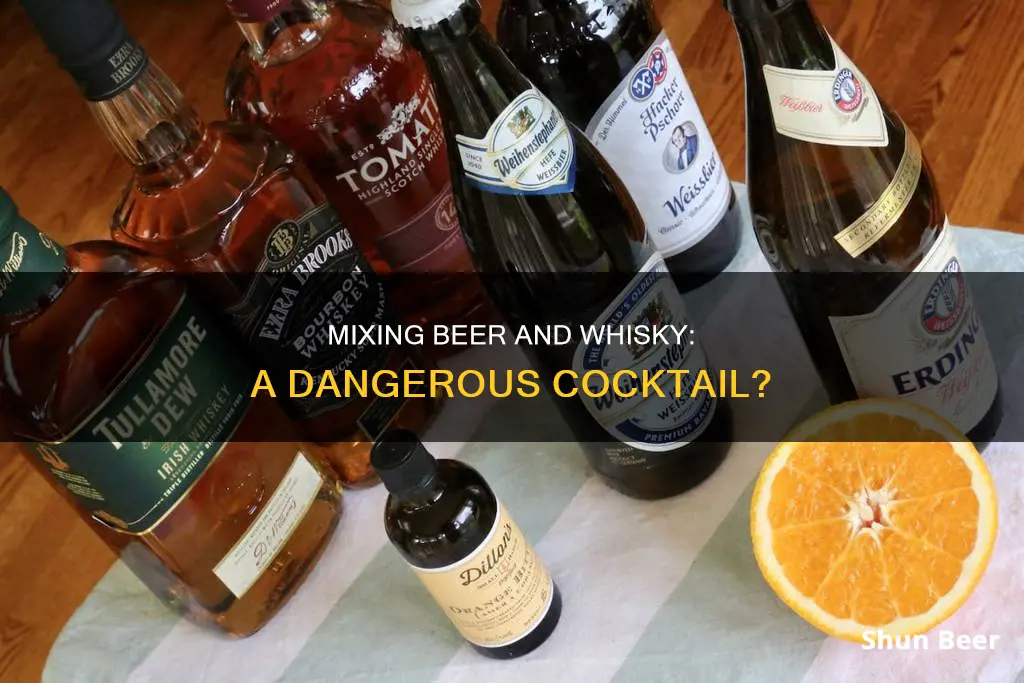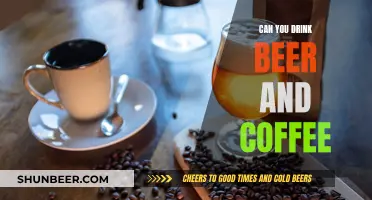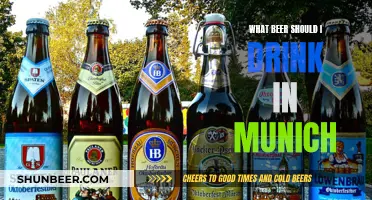
Drinking beer and whisky together is known as a boilermaker or a shot and a beer. This combination has become a blue-collar institution in the US, and is also popular in other countries, including England, Scotland, Germany, the Netherlands, South Korea, and Sweden. While some believe that drinking beer before liquor can lead to a worse hangover, experts say that it is the amount of alcohol consumed, rather than the order or type of drinks, that matters.
What You'll Learn

Beer and whisky together is called a 'boilermaker'
Beer and whisky together is called a boilermaker. This drink originated in Butte, Montana, in the 1890s and was originally called a Sean O'Farrell. It was served to miners when they ended their shifts. The drink consists of a glass of beer mixed with a shot of whiskey.
There are two ways to drink a boilermaker. The traditional way is to consume the whisky in one gulp and then chase it with beer. The other way is to mix the whisky and beer by pouring or dropping the shot into the beer. The mixture can be stirred or left unstirred. If the shot glass is dropped into the beer glass, the drink is called a depth charge.
The term "boilermaker" was first used to refer to craftsmen who built and maintained steam locomotives in 1834. It is believed that the drink was named after these workers because it was a popular drink among factory workers who fabricated the boilers of locomotive engines.
The boilermaker is a strong drink that is typically reserved for celebrations. It is important to drink responsibly and in moderation, as consuming too much alcohol can lead to negative consequences such as hangovers, impaired judgment, and health risks.
The type of beer and whisky used in a boilermaker can vary according to personal preference. However, certain liquors do pair better with certain beers. For example, a classic bourbon or rye whiskey pairs well with a light lager, while bold Irish whiskeys go well with an IPA.
Hopsy Beer: How Does the Freshness Work?
You may want to see also

The order in which you consume your drinks does not matter
The belief that the order of drinks affects hangovers may stem from the fact that people tend to drink faster as they become more intoxicated. If you start with beer and then switch to liquor, you may find yourself consuming a higher volume of alcohol at a faster rate, leading to a spike in blood alcohol levels and a nasty hangover. However, this is not due to the specific combination of drinks but rather the increased consumption and the higher alcohol content of liquor.
Similarly, starting with liquor and then switching to beer may give the impression of "weaning yourself off" the stronger drink, but this is simply a result of the lower alcohol content and slower rate of consumption of beer compared to liquor. It is important to note that drinking liquor first does not inherently prevent a hangover, as the total amount of alcohol consumed is the key factor.
Mixing beer and whisky is a popular combination known as a "boilermaker" or a "shot and a beer". This pairing has a long tradition, especially in the United States, where it is considered a blue-collar institution. While the order of consumption may not impact your hangover, finding the right pairing of beer and whisky can elevate your drinking experience.
When pairing beer and whisky, consider the characteristics of each beverage and aim for complementary or contrasting flavours. For example, a German rauchbier, with its smoky flavour, can complement the smoky notes of an Islay whisky. On the other hand, a hop-forward IPA or a rich and complex stout can provide a contrasting flavour profile to the whisky.
Beer and Abilify: What You Need to Know
You may want to see also

Beer before whisky can make you sicker
"Beer before whisky, always risky", "Beer before liquor, never been sicker; liquor before beer, you're in the clear", and "Beer before wine and you'll feel fine" are all variations of a well-known drinking saying. This saying is often used as a rule of thumb for those who want to avoid a hangover. However, there is little scientific evidence to support this theory.
The idea that drinking beer before whisky (or any other spirit) will make you sick is a myth. It is not the order in which you drink different types of alcohol that matters, but rather the amount you drink. Drinking too much of any alcoholic beverage can lead to negative side effects, such as a hangover, regardless of whether it is wine, beer, or liquor.
The myth that beer before whisky will make you sick may have originated from the way we digest alcohol. Carbonated drinks, like beer, can irritate the stomach lining, increasing the rate of alcohol absorption. It is also common for people to start their nights out with beer and progress to liquor, so when they get sick at the end of the night, they blame the last drink they had. However, it is important to note that drinking liquor before beer will not create any chemical reaction that prevents hangovers. The severity of a hangover depends on various factors, including how much you drink, whether you ate before drinking, how often you drink, and your genetics.
While it is a myth that drinking beer before whisky will make you sick, it is important to note that mixing different types of alcohol can affect people differently. The combination of beer and whisky, for example, may be more intoxicating than drinking them separately. This is because whisky has a higher alcohol content than beer, so starting with whisky may cause your inhibition to decrease more quickly, leading you to drink more beer than you otherwise would have.
In conclusion, while "beer before whisky, always risky" may not be true in terms of hangovers, it is important to be cautious when mixing different types of alcohol. The key to avoiding negative side effects is to pace yourself and drink in moderation.
Beer and Covid: What's Safe?
You may want to see also

Whisky before beer, you have nothing to fear
There is an age-old saying that goes, "Whisky before beer, you have nothing to fear." This is a variation of the more common saying, "Beer before liquor, never been sicker; liquor before beer, you're in the clear." The saying is meant to guide drinkers on how to avoid a hangover. However, there is little scientific evidence to support this claim.
The order in which you consume your drinks does not matter when it comes to avoiding a hangover. What matters is the amount of alcohol you consume and how fast you consume it. Your body can only process a certain amount of alcohol per hour, and if you drink too much, you will end up with a hangover.
The saying may have persisted due to the observation that when people start with beer, they tend to drink slowly at first, and then switch to liquor, increasing their rate of consumption and the amount of alcohol they ingest. This can lead to blackouts and severe hangovers. On the other hand, starting with liquor gives you a higher alcohol content per drink from the beginning, and when you switch to beer, you are essentially weaning yourself off, decreasing your alcohol intake per drink.
Some people also believe that carbonated beverages like beer can irritate the stomach lining, causing you to absorb alcohol more quickly. Research has shown that people absorb vodka faster when it is mixed with carbonated water.
However, the ultimate determinant of how you will feel after drinking is the amount of alcohol you consume. Genetics also plays a role, with some people being more susceptible to hangovers than others. Other factors include not drinking enough water, not eating while drinking, and drinking on an empty stomach.
In conclusion, while the saying "Whisky before beer, you have nothing to fear" may have some observational backing, the key to avoiding hangovers is simply drinking in moderation.
Beer and Lithium: What's the Verdict?
You may want to see also

Beer and whisky can be paired together
There are a variety of ways to drink a boilermaker. The traditional way is to consume the whisky in a single gulp and then "chase" it with the beer, which is sipped. Alternatively, the whisky and beer can be mixed by pouring or dropping the shot into the beer. The mixture can be stirred, or the shot glass can be dropped into the beer to create a "depth charge".
Different types of beer and whisky can be paired together to create unique boilermakers. For example, a German pairing is Korn (grain brandy) and beer, while a Dutch pairing is Jenever (Dutch gin) and beer. In Scotland, a popular combination is a half-pint of beer with a whisky, known as a "half and a half" or a "wee hawf".
The boilermaker is a versatile cocktail that can be customised to suit different tastes and preferences. It is a popular choice for those who enjoy the ritual of drinking beer and want to add a little extra kick with a measure of whisky.
Invisalign and Beer: What's the Deal?
You may want to see also
Frequently asked questions
Drinking beer and whisky together is safe. The order in which you consume your drinks does not matter. It is the amount of alcohol you drink that matters.
A boilermaker is a cocktail that consists of a glass of beer mixed with a shot of whiskey. It is also known as a "shot and a beer". The cocktail originated in Butte, Montana, in the 1890s, and was originally called a Sean O'Farrell.
Here are some popular beer and whisky pairings:
- Sierra Nevada Pale Ale with Maker's Mark
- Williams Bros. Midnight Sun with Crown Royal Harvest Rye
- Karg Helles Weißbier with West Cork 10-year-old single malt







